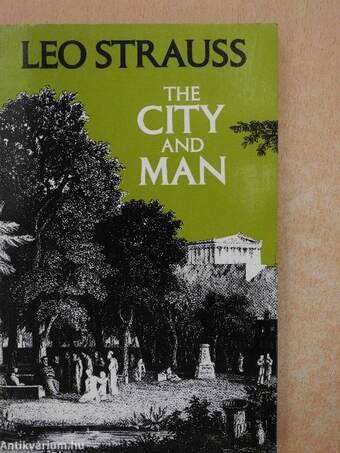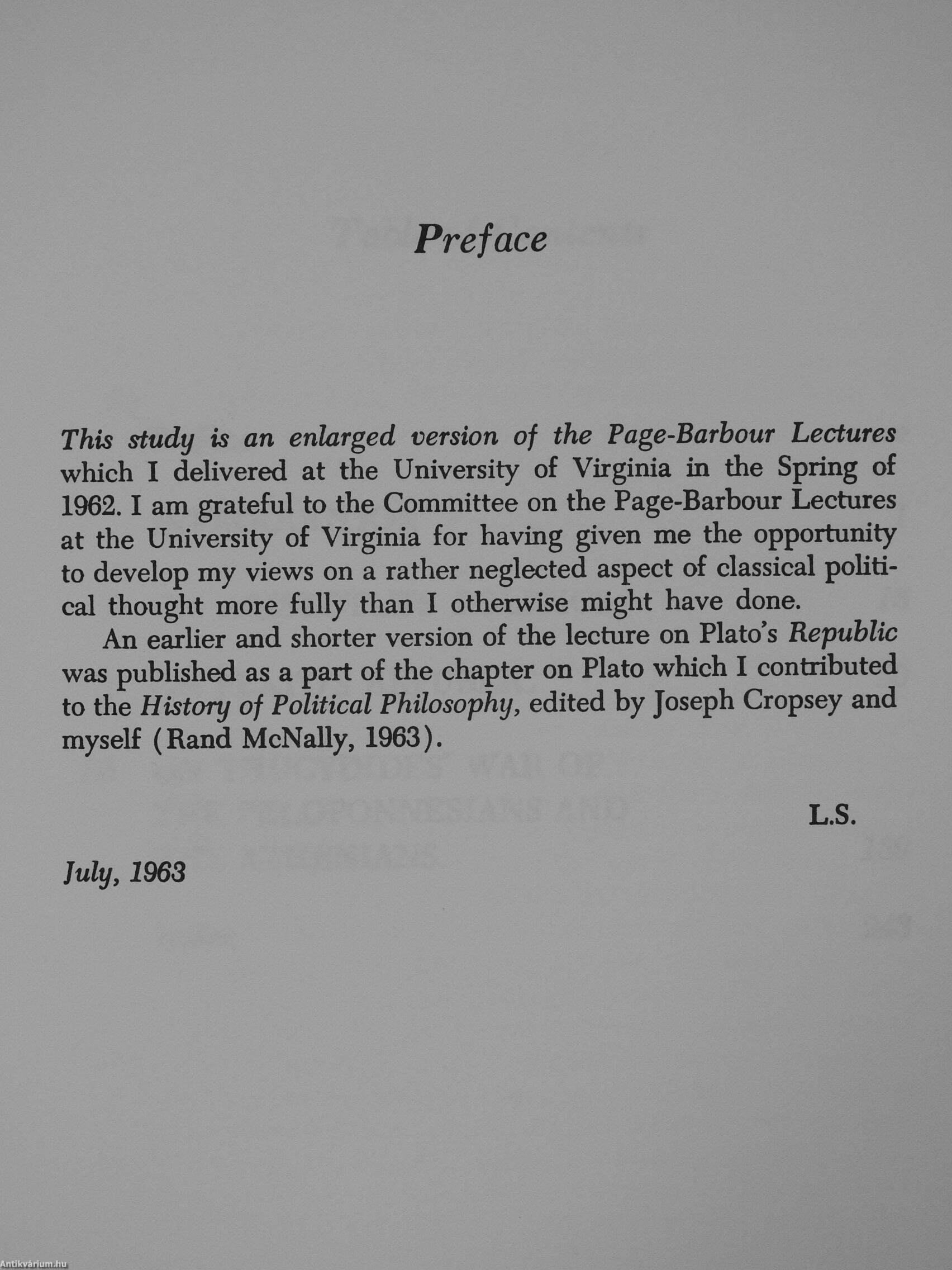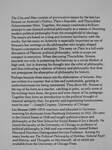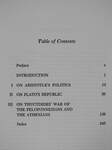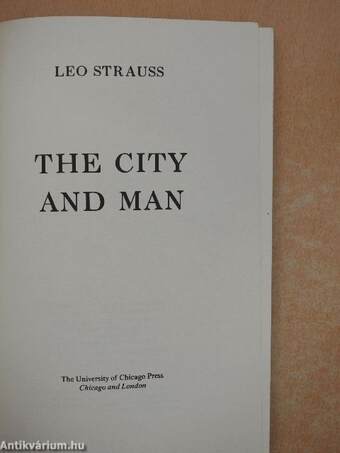1.117.336
kiadvánnyal nyújtjuk Magyarország legnagyobb antikvár könyv-kínálatát
The City and Man
| Kiadó: | The University of Chicago Press |
|---|---|
| Kiadás helye: | Chicago-London |
| Kiadás éve: | |
| Kötés típusa: | Ragasztott papírkötés |
| Oldalszám: | 245 oldal |
| Sorozatcím: | |
| Kötetszám: | |
| Nyelv: | Angol |
| Méret: | 23 cm x 15 cm |
| ISBN: | 0-226-77701-4 |
naponta értesítjük a beérkező friss
kiadványokról
naponta értesítjük a beérkező friss
kiadványokról
Előszó
TovábbFülszöveg
The City and Man consists of provocative essays by the late Leo Strauss on Aristotle's Politics, Plato's Republic, and Thucydides' Peloponnesian Wars. Together, the essays constitute a brilliant attempt to use dassical politicai philosophy as a means of liberating modem politicai philosophy from the stranglehold of ideology. The essays are based on a long and intimate familiarity with the works, but the essay on Aristotle is especially important as one of Strauss's few writings on the philosopher who largely shaped Strauss's conception of antiquity. The essay on Plato is a full-scale discussion of Platonic politicai philosophy, wide in scope yet compact in execution. When discussing Thucydides, Strauss succeeds not only in presenting the historian as a moral thinker of high rank, but in drawing his thought into the orbit of philosophy, and thus indicating a relation of history and philosophy that does not presuppose the absorption of philosophy by history.
"Perhaps because these... Tovább
Fülszöveg
The City and Man consists of provocative essays by the late Leo Strauss on Aristotle's Politics, Plato's Republic, and Thucydides' Peloponnesian Wars. Together, the essays constitute a brilliant attempt to use dassical politicai philosophy as a means of liberating modem politicai philosophy from the stranglehold of ideology. The essays are based on a long and intimate familiarity with the works, but the essay on Aristotle is especially important as one of Strauss's few writings on the philosopher who largely shaped Strauss's conception of antiquity. The essay on Plato is a full-scale discussion of Platonic politicai philosophy, wide in scope yet compact in execution. When discussing Thucydides, Strauss succeeds not only in presenting the historian as a moral thinker of high rank, but in drawing his thought into the orbit of philosophy, and thus indicating a relation of history and philosophy that does not presuppose the absorption of philosophy by history.
"Perhaps because these essays are the elaboration of lectures, they are written in a manner that is free and comfortable, gaining in authoritativeness for being unstrained. They show Mr. Strauss at the top of his form as a teacher, catching in print, as only some of his writings have done, the grace and even charm of his pedagogy. Together they form an introduction to the politicai thought of dassical antiquity that, for gravity and ingratiating luminousness, must be rare."—Joseph Cropsey, University of Chicago Leo Strauss (1899-1973) was born and educated in Germany, receiving his doctorate from Hamburg University in 1921. He carne to the United States in 1938 and taught politicai science and philosophy at the New School for Sodai Research for a decade. He joined the faculty of the University of Chicago as professor of politicai philosophy in 1949 and was eventually named Robert Maynard Hutchins Distinguished Service Professor. Among his many books are The Politicai Philosophy ofHobbes; Naturai Right and History; and Thoughts on Machiavelli, ali of which are available from the University of Chicago Press. Vissza
Témakörök
- Történelem > Társadalomelmélet
- Filozófia > Témaköre szerint > Filozófiatörténet > Tanulmányok
- Idegennyelv > Idegennyelvű könyvek > Angol > Filozófia > Témaköre szerint > Filozófiatörténet > Tanulmányok
- Idegennyelv > Idegennyelvű könyvek > Angol > Történelem > Európa története > Egyéb
- Idegennyelv > Idegennyelvű könyvek > Angol > Történelem > Egyéb
- Filozófia > Témaköre szerint > Tanulmányok, esszék
- Filozófia > Témaköre szerint > Szakfilozófiák
- Idegennyelv > Idegennyelvű könyvek > Angol > Filozófia > Témaköre szerint > Tanulmányok, esszék
- Idegennyelv > Idegennyelvű könyvek > Angol > Filozófia > Témaköre szerint > Szakfilozófiák
- Történelem > Idegennyelvű > Angol
- Történelem > Politika > Egyéb
- Filozófia > Témaköre szerint > Társadalomfilozófia > Egyéb
- Idegennyelv > Idegennyelvű könyvek > Angol > Filozófia > Témaköre szerint > Társadalomfilozófia > Egyéb
- Történelem > Ókor > Görögök
Leo Strauss
Leo Strauss műveinek az Antikvarium.hu-n kapható vagy előjegyezhető listáját itt tekintheti meg: Leo Strauss könyvek, művekMegvásárolható példányok
Nincs megvásárolható példány
A könyv összes megrendelhető példánya elfogyott. Ha kívánja, előjegyezheti a könyvet, és amint a könyv egy újabb példánya elérhető lesz, értesítjük.


